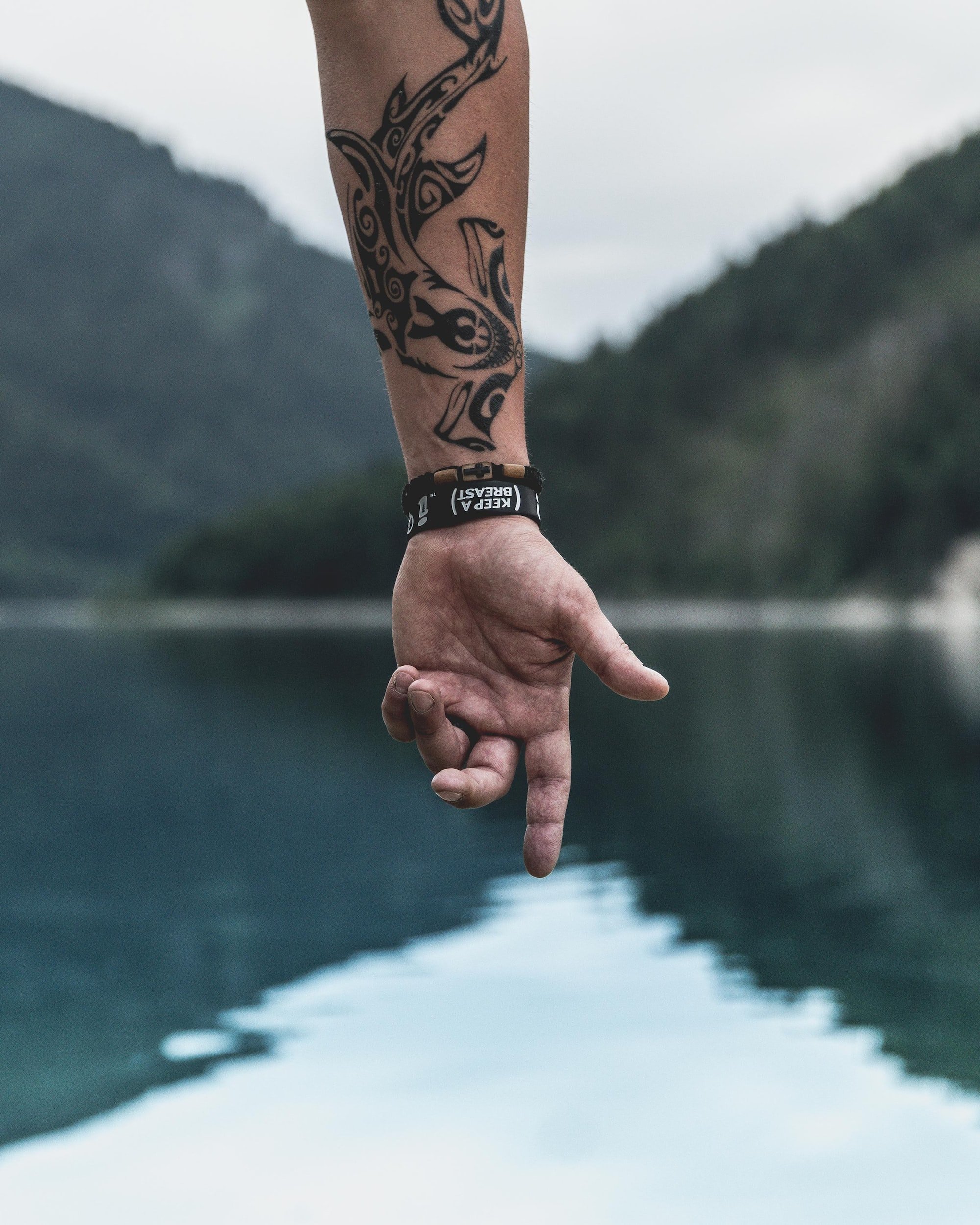Common Causes of Raised Tattoos: Explanations and Treatments
/If you have ever noticed your tattoo becoming raised, you may wonder what is going on with your skin. A raised tattoo can be concerning, but it is not uncommon. In fact, raised tattoos are a very common occurrence among tattoo enthusiasts.
A raised tattoo occurs when the skin around the tattoo becomes swollen, bumpy, or elevated due to irritated scar tissue and/or histamine response from the body. This can happen shortly after getting a tattoo, or it can develop over time. The raised area may be itchy, painful, or feel uncomfortable.
It is important to understand the causes of raised tattoos to determine the best course of action for alleviating the symptoms. Some of the common causes include weather conditions, body chemistry, and allergic reactions. By identifying the root cause, you can take appropriate steps to treat the symptoms and prevent further discomfort. In this blog post, we will discuss the various causes of raised tattoos and provide advice on how to identify and treat them.
Understanding the Biology of Tattoos and How it Affects the Skin
Tattoos are considered a form of skin injury, which can result in a hypertrophic scar or keloid during the healing process, according to dermatologist Melanie Palm. This is one reason why tattoos can be itchy and raised. The inflammation that occurs during the healing process can cause mast cells to release histamine, the same substance that causes allergies, hives, and itchiness, explains dermatologist Shari Marchbein. The break in the skin barrier caused by tattoos also makes the skin more reactive and vulnerable to irritants and moisture loss, says dermatologist Mona Gohara. Ink particles reside between the skin cells, which disrupts the barrier that keeps irritants out and moisture in. This added sensitivity can exacerbate the itchiness of tattoos.
These biological variables can all be influenced and exacerbated by a number of environmental impacts like weather or a persons unique biology.
Hot, Cold and Humid: How Weather Can Affect Tattoos
Weather conditions can significantly affect the appearance and sensation of tattoo ink in the skin, especially during extreme conditions. Hot weather, for example, can cause tattoos to become raised and swollen, leading to discomfort and changes in the tattoo's overall appearance. This happens when the heat of the environment affects the ink in the skin causing it to expand. The dry conditions of hot weather can also irritate the skin and prompt a slight histamine response, causing tattoo ink to become raised. Lastly, direct sun exposure may agitate certain inks and result in a mild photodermatitis.
Cold weather, on the other hand, can cause the skin around the tattoo to become dry and flaky, affecting the tattoo's appearance and sensation as well.
In addition to extreme temperatures, humidity also plays a role in raising tattoos. High levels of moisture in the air can cause the skin to become more pliable, leading to a raised appearance. This is especially true for those living in humid climates, where the skin is exposed to excess moisture regularly. It's crucial to understand the impact of weather conditions on tattoos to maintain their appearance and prevent discomfort or irritation.
In the following sections, we'll explore other common causes of raised tattoos, including body chemistry and allergic reactions, and provide advice on how to alleviate the symptoms of these issues.
Skin Type and Raised Tattoos: Understanding the Link
Body chemistry can also play a role in the appearance of raised tattoos. Skin type is an important factor to consider, as certain skin types are more prone to raised tattoos than others. For example, people with oily skin may be more likely to experience raised tattoos due to the excess sebum production in their skin. Similarly, people with dry or sensitive skin may be more prone to irritation and inflammation, which can also cause tattoos to become raised.
Skin conditions such as eczema, psoriasis, and dermatitis can also contribute to the development of raised tattoos. These conditions can cause the skin to become inflamed, which can result in a raised appearance of tattoos. It's important to note that having a skin condition doesn't necessarily mean that a person will have a negative reaction to a tattoo, but it is something to consider and discuss with a dermatologist or tattoo artist before getting a tattoo.
Its also important to remember that heavy perfumes and dyes from certain health and beauty supplies can also interact with your tattoo in unforeseen ways causing irritation, swelling and raised ink.
Understanding the impact of body chemistry on raised tattoos can help individuals make informed decisions about getting tattoos and managing their appearance. In the following section, we'll discuss the role of allergic reactions in the development of raised tattoos and provide tips for managing these reactions.
If you have any concerns about skin conditions and your tattoos please consult with a Dermatologist
Allergic Reaction Symptoms: What to Look Out for After Getting a Tattoo
Allergic reactions are another common cause of raised tattoos. Tattoo ink contains a variety of chemicals, some of which can cause an allergic reaction in certain individuals. Even if you have not had a strong allergic reaction to your tattoo immediately the body's histamine response system can become provoked days, weeks or even years after getting a tattoo! The reasons for this could be environmental, dietary, or other changes in biology.
It is also possible that you may have a mild allergy to something used in the tattoo process and it may not cause your body to respond right away but may do so after some delay.
Common allergens found in tattoo ink include nickel, cobalt, (though heavy metals are not as common in tattoo ink these days) and red and yellow pigments. Additionally, some people may be allergic to the latex gloves used by the tattoo artist during the tattooing process.
Symptoms of an allergic reaction to tattoo ink can vary in severity and can include redness, itching, swelling, and raised bumps or hives. In more severe cases, individuals may experience difficulty breathing or a rapid heartbeat.
If you suspect you may be experiencing an allergic reaction to your tattoo, it's important to seek medical attention right away. Treatment may involve the use of topical or oral steroids, antihistamines, or even tattoo removal.
To prevent allergic reactions, it's important to discuss any known allergies with your tattoo artist before getting a tattoo.
If you are experiencing allergic symptoms related to your tattoo years after getting it, this will usually subside on its own. Relief can be found from icing and moisturizing. Try not to scratch too much as this can actualy cause the symptoms to worsen!. In more intense situations a dermatologist may use injectable anti-inflammatories such as steroid or 5-fluorouracil, placed in the tattoo.
Identifying the Cause of a Raised Tattoo
Identifying the cause of a raised tattoo can be challenging, but it's important in order to determine the best course of action for treatment. One tip for determining the cause is to consider the timing of the raised appearance - did it occur immediately after getting the tattoo or after it had already healed?
If it was immediate, the causes could be your bodies reaction to the ink or the healing process. Usually the after effects of getting a tattoo are very mild and normal.
Another tip is to consider any changes in skincare routine or exposure to potential irritants around the time the tattoo became raised.
Also consider dietary and lifestyle habits. You would be surprised what will cause a tattoo to become mildly agitated. A night of drinking could do it!
If a raised tattoo is accompanied by symptoms such as extreme itching, pain, or swelling, it may be time to seek medical attention. A dermatologist can help determine the cause of the raised tattoo and recommend appropriate treatments. In some cases, the best course of action may be to remove the tattoo altogether.
Alleviate Discomfort From a Raised Tattoo with Home Remedies
If you're experiencing discomfort from a raised tattoo, there are several home remedies you can try to alleviate the symptoms.
Applying a cold compress or ice pack to the area can help reduce inflammation and relieve itching. Over-the-counter topical creams containing hydrocortisone or pramoxine can also help alleviate symptoms.
It's important to avoid scratching or picking at the tattoo, as this can worsen the symptoms and increase the risk of infection.
If home remedies aren't providing relief, or if you're concerned about the appearance or health of your tattoo, it's important to consult a dermatologist. A dermatologist can examine the tattoo and determine the best course of action, which may include prescription creams or ointments, corticosteroid injections, or even tattoo removal.
In some cases, raised tattoos may be a sign of an underlying skin condition, such as eczema or psoriasis. Identifying and treating the underlying condition is key to managing the symptoms of a raised tattoo. A dermatologist can help determine if there is an underlying condition and provide appropriate treatment.
Conclusion
In conclusion, there are several common causes of raised tattoos, including infection, scarring, excessive sun exposure, allergic reactions, and even certain medical conditions. It's important to identify the cause of a raised tattoo in order to determine the best course of treatment, which may include home remedies, medical intervention, or even tattoo removal.
To prevent raised tattoos, it's important to take proper care of your tattoo during the healing process and avoid exposing it to excessive sun or irritants. It's also recommended to discuss any known allergies with your tattoo artist and have a patch test done prior to getting the full tattoo.
If you do experience a raised tattoo, don't panic. With the proper care and attention, the symptoms can be managed and the tattoo can heal properly. And if you're ever concerned about the appearance or health of your tattoo, don't hesitate to consult a dermatologist for guidance and treatment. Remember, a little bit of prevention can go a long way in ensuring the beauty and health of your tattoos for years to come.
Thanks for reading!
































